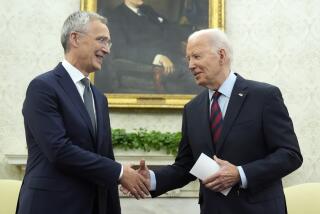Lenders Urge Military Cuts in Developing World : Global aid: IMF and World Bank hint they may stop tolerating poor countries’ efforts to build war machines.
- Share via
BANGKOK, Thailand — The annual meeting of the International Monetary Fund and World Bank opened here Tuesday with strong calls by the heads of both organizations for nations--particularly in the developing world--to reduce their military spending.
The statements suggest that the two international lending institutions, whose support often is critical to Third World development efforts, may no longer tolerate efforts by poor countries to build large military machines.
The potential threat that some of those countries might present has drawn new attention since the war with Iraq and the easing of tension between the United States and the Soviet Union.
Lewis T. Preston, in his first major policy address as president of the World Bank, noted that military spending in many developing countries far exceeds the amount they devote to education and health combined. “Given the changing world order, the security situation in all countries may permit a reduction in present defense outlays,” Preston said.
Michel Camdessus, managing director of the IMF, delivered a similar message. Welcoming the reductions that are being contemplated by the superpowers, Camdessus said: “International tensions are subsiding, and this should allow deep cuts for the first time in perhaps more than half a century. . . . A lot is at stake here.”
He estimated that if all countries would reduce military spending to no higher than the current world average of 4.5% of gross domestic product, they could free up $140 billion for other uses.
A group of developing-country representatives, issuing a statement before Tuesday’s official start of the IMF and World Bank sessions, made it clear that they are irritated by what they perceive as meddling. They urged the IMF and World Bank to stick within the bounds of their charters and “resist being drawn into political issues.”
Attending the annual meetings for the first time are the Soviet Union and its three former Baltic republics, Estonia, Latvia and Lithuania. All have applied for membership in the IMF and World Bank--institutions denounced for decades by the Communist government in Moscow.
The Soviet Union’s perilous economic situation has overshadowed the traditional issues at these meetings. The sessions themselves have seemed almost an anticlimax to last weekend’s dramatic meetings here between a Soviet delegation and economic policy-makers of the world’s seven leading industrial powers, known as the Group of Seven.
In their addresses, Camdessus and Preston sought to turn attention back to the concerns of the developing world. Many representatives of those countries here have complained that they are being slighted.
Camdessus described this as a moment of “historic opportunity, stemming from the better prospects for peace and development.” He noted that some nations considered economic basket cases only a few years ago are now being viewed as success stories because they have reduced their indebtedness and implemented market-oriented economic policies.
“Several debtor countries, and I mention only Chile, Mexico and Venezuela as examples, are now leaving the ranks of countries with serious debt problems and joining those of countries with buoyant opportunities,” he said.
Indeed, a senior U.S. official said that Mexico, Venezuela, Argentina and Brazil have offered funds to be used by other Latin countries that are seeking to implement market reforms--giving a significant political boost to the Bush Administration’s efforts to get that program going. Pending expected congressional approval, the Administration hopes to begin the program, known as the Multilateral Investment Fund, by early December.
More to Read
Sign up for Essential California
The most important California stories and recommendations in your inbox every morning.
You may occasionally receive promotional content from the Los Angeles Times.













